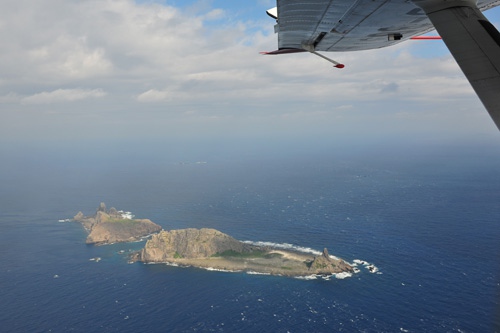|
 |
|
EXERCISING SOVEREIGNTY: A photo taken from a marine surveillance plane on December 13, 2012 shows the Diaoyu and nearby islands. A Chinese aircraft was sent to join vessels patrolling territorial waters in the area (XINHUA) |
The Chinese Government's recent announcement of an air defense identification zone (ADIZ) over the East China Sea has met with opposition from Japan and the United States, which claimed that the move has altered the regional status quo in a way that may destabilize the situation.
"Frankly speaking, it is Japan that unilaterally altered the regional status quo in 2012 by 'purchasing' the Diaoyu Islands; and the United States, a country outside the region, is destabilizing the regional situation by meddling in island disputes in the East China Sea," said Luo Yuan, Deputy President of China Strategic Culture Promotion Association and a Major General of the Chinese People's Liberation Army (PLA).
Both Japan and the United States have established their own ADIZs within the last century. At its closest, the Japanese ADIZ extends to just 130 km from China's mainland.
Zhang Junshe, a senior researcher at the PLA Naval Military Studies Research Institute, said China's establishment of an ADIZ over the East China Sea is not directed against any specific country or target, adding the announcement of the details of its ADIZ is an important step in increasing military transparency.
The demarcation of the zone will not only boost the country's air defense early warning capability, but also avoid military misjudgments over foreign aircraft, said Zhang.
Foreign aircraft should report their flights and follow other regulations if they enter the zone—an important measure for the two sides to understand the situation at sea and across the airspace in a timely manner, according to Zhang.
A natural move
Yang Yujun, spokesman of China's Ministry of National Defense (MND), said in a media briefing that the establishment of the East China Sea ADIZ is indisputable. It aims to safeguard the country's national sovereignty as well as territorial and airspace safety, ensuring orderly flights.
ADIZ is an early-warning air defense concept. It is a zone that can extend in some cases up to 300 miles beyond the territorial sea. Some maritime nations establish such zones off their coasts for security purposes such as guarding against potential air threats. When entering the zone, all aircraft are required to identify themselves, report flight plans, and inform ground control of their exact position.
Xing Hongbo, a senior Chinese legal expert, said the establishment of such a zone over the East China Sea follows standard international practices. ADIZ is a common practice compatible with current international law, with the tacit approval of most countries.
The ADIZ practice is currently implemented in more than 20 countries. After Japan's surrender at the end of World War II, the United States demarcated an ADIZ off Japan's coasts, but it was under the control of the U.S. military. It wasn't until 1969 that the United States transferred management of the zone to Japan. After that, Japan expanded the zone westward twice, once in 1972, and again in 2010. Japan follows a warning sequence for unidentified aircraft: radar detection, emergency calls, emergency fighter launch, requiring forced landing, and bomb warning.
In fact, neighboring countries around China, such as the Republic of Korea, the Philippines and Viet Nam, have all set up their own ADIZs in the past.
Xing said the zone has substantial legal differences with the concept of territorial air space, which comprises part of a state's territory and incorporates exclusive rights within that air space. But the ADIZ demarcated outside the territorial airspace allows a country to identify, monitor, control and dispose of entering aircraft.
Since the zone is both in line with the UN Charter and abides by relevant international laws and customs without breaching other countries' territorial sovereignty or affecting the freedom of flight, China has the right to set up such zones without permission from any other countries, Xing said.
Groundless concerns
Predictably, almost immediately upon the announcement of China's ADIZ, Tokyo and Washington voiced "concerns."
Japanese Prime Minister Shinzo Abe told a parliamentary session that China's ADIZ action was a "profoundly dangerous act that may cause unintended consequences" as he urged China to "retract the decision." U.S. Secretary of State John Kerry declared China's move could "constitute an attempt to change the status quo in the East China Sea," adding that it will "increase tensions in the region and create risks of an incident."
Observers said that Tokyo and Washington's accusations against China demonstrated an aggressive stance, as both countries set up their own ADIZs decades ago. "Considering Abe's request, China could in turn ask the Japanese side to abolish its own air defense identification zone established in 1969; China would then agree to take the same step 44 years later," said Yang.
"From their reasoning, it seems that the magistrates are free to burn down houses while the average people are forbidden even to light lamps," said Luo.
| 